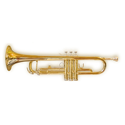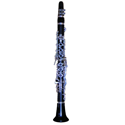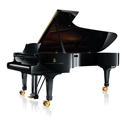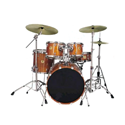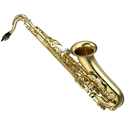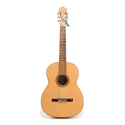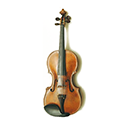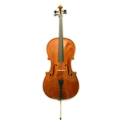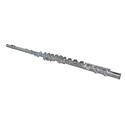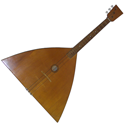Немно́го о языке́ 3.8 Джош на уро́ке
Playing musical instruments…
You’ve already seen that when talking about games and sports, the verb игра́ть (stem: играй-) has a complement of в plus the accusative case.
In this section, we will see that to talk about playing musical instruments, we use the construction игра́ть + на + prepositional case.
If you play an instrument that is not listed here, you might have a look at this illustrated Энциклопе́дия музыка́льных инструме́нтов before you ask your teacher.
Упражне́ние 1
Inidcate what instrument the people below play.
Учи́ться and other verbs with the particle –ся
In this section of the unit you meet the verb учи́ться in its meaning “to be a student, to study in an institution.”
The stem of the second conjugation verb учи́ться is уч- , and the ч at the end of the stem requires us to adjust our spelling of verb endings.
You already know that the letter ч is one of the seven letters (г к х ж ш ч щ) after which you must write –и (and not ы). After these same seven letters and ц, one can also not write –ю and –я (standard endings for second conjugation verbs) but writes –у and –а in their places. This is known as the eight-letter spelling rule.
The second issue with conjugating the verb учи́ться concerns the particle –ся. It attaches to the end of the conjugated verb, and it is spelled as –ся when the verb form ends in a consonant, but as –сь when the verb form ends in a vowel.
While the –ся particle causes no change in how verbs conjugate, you should be careful not to leave off the -сь/-ся or add –сь/-ся unnecessarily. For many verbs, the present or absence of ся will significantly change the meaning of the verb.
Verbs for Talking about Locations.
In this section of Unit 3, you encounter the forms нахо́дится and нахо́дятся. These are the third-person singular and third-person plural forms of the verb находи́ться = to be located. These forms are frequently used in specifying locations, especially when dealing with proper place names that might be unfamiliar to a Russian ear. It is grammatically correct to say:
Про́виденс в Род-А́йленде. = Providence is in Rhode Island.
Топи́ка в Канза́се. = Topeka is in Kansas.
HOWEVER, your Russian listeners will benefit from you being more explicit, labeling the proper place name with a generic term (го́род, штат) and using the forms нахо́дится/нахо́дятся to let your listeners know that you are talking about locations.
Го́род Про́виденс нахо́дится в шта́те Род-А́йлeнд.
Го́род Топи́ка нахо́дится в шта́те Канза́с.
Штат Канза́с нахо́дится в Аме́рике.
Города́ Миннеа́полис и Сент-Пол нахо́дятся в Миннесо́те.
Adjective endings in the prepositional case
In Unit 2, the adjective endings that you learned (basic endings: ый / -ая / -ое) agree with nouns in the nominative case. When nouns are in the prepositional case, adjectives will have to match them in the prepositional form.
In the prepositional case, the basic adjective ending for masculine and neuter forms is –ом and for feminine nouns is –ой. The alternative endings for spelling rule considerations is: -ем and –ей, respectively.
These adjective endings are summarized in this table:
Упражне́ние 2. Listening and hearing adjective endings
You will hear a number of sentences, each of which contains a single adjective. Some of the sentences will have adjectival phrases in the nominative case, others will have phrases in the accusative or prepositional case. Listen and choose the correct ending for the adjective you hear.
Упражне́ние 3
Pick the nouns that best complete the sentences from a grammatical standpoint.
Talking about universities
Most university names in Russian are expressed by an adjective plus the word университе́т. When a person talks about studying at that university, then one will use the verb учи́ться + в + prepositional case of the adjective + университе́те.
Упражне́ние 4.
Listen to each statement about where each character is studying and choose whether the statement is true or false.
In the exercise above you can see adjectives made from the names of the places where our students are studying. Can you figure out how that process works?
The -ский suffix is very productive in Russian and is often used for turning foreign names and foreign place names into adjectives. Below are some common US institution names.
- …. у́чится в По́ртлендском госуда́рственном университе́те.
- …. у́чится в Га́рвардском университе́те
- …. у́чится в Колумби́йском университе́те
- …. у́чится в Индиа́нском университе́те
- …. у́чится в Канза́сском университе́те
- …. у́чится в Калифорни́йском университе́те в Бе́ркли
- …. у́чится в Дю́кском университе́те
- …. у́чится в Теха́сском университе́те в Óстине
- …. у́чится в Бра́унском университе́те
- …. у́чится во Флори́дском университе́те
- …. у́чится в Аризо́нском университе́те
Ordinal numbers
So far in Russian you have learned to count using the cardinal numbers for 0-10. In the table below you will find the associated ordinal numbers.
| 1st | пе́рвый | 6th | шесто́й |
| 2nd | второ́й | 7th | седьмо́й |
| 3rd | тре́тий | 8th | восьмо́й |
| 4th | четвёртый | 9th | девя́тый |
| 5th | пя́тый | 10th | деся́тый |
The ordinal numbers in Russian are adjectives and agree with the noun they modify. With the exception of тре́тий, they all have regular adjective endings. Третий has the following exceptional forms that occur because the и is a fill-vowel that is replaced by –ь- when followed by endings that begin with a vowel.
| Masculine | Feminine | Neuter | |
|---|---|---|---|
| Nominative singular | тре́тий эта́ж | тре́тья ко́мната | тре́тье окно́ |
| Accusative | тре́тий эта́ж | тре́тью ко́мнату | тре́тье окно́ |
| Prepositional | на тре́тьем этаже́ | в тре́тьей ко́мнате | в тре́тьем окне́ |
Упражне́ние 5.
Images of musical instruments courtesy of Wikimedia Commons and Pixabay:
trumpet, clarinet, piano, drums, saxophone, guitar, violin and viola, cello, flute, balalaika.

